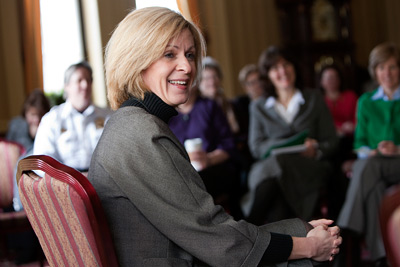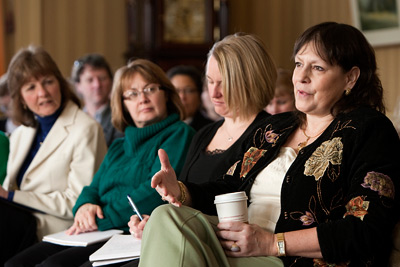V.P. Opperman to staff: 'Stick with Cornell'
By Susan Kelley


The Cornell of tomorrow is why staff should stick with Cornell today. That was the message Vice President for Human Resources Mary George Opperman delivered at a March 4 brown-bag lunch in Sage Hall on managing change.
Opperman encouraged staff members to read the draft of the university's strategic plan to stay motivated. "That's the Cornell of tomorrow," she said. "That's what gives you the reason to keep working here. You need to look ahead."
Opperman also said she understood that some feel the university's planning initiatives have taken a long time. "We are very decentralized, and very complex, and it takes a very long time to make sense of the ways we do things." The careful planning will help the university make sensible changes; but layoffs will be necessary to chip away at the university's budget deficit, she said.
Paul Streeter, associate vice president for budget and planning, co-hosted the event and put the deficit into perspective. "It's about a $68 million deficit on about a $2 billion operating budget, that's something like a 3.5 percent gap."
Kathie Bennett, an accounts representative in the Office of the Dean of Engineering, asked how many layoffs would occur in the spring. That will depend on how much administrative savings the university can wring out of non-personnel areas such areas as procurement and energy conservation. The Initiatives Coordination Office (ICO) will report its findings on those potential savings in the spring. In the meantime, Opperman said, individuals must do their part in helping the efforts to save in the non-personnel areas. These efforts will have a direct impact on the deficit on how much needs to be cut from the workforce, she said.
When asked why the university doesn't simply reduce the number of faculty members, who are generally paid more than staff, Opperman said that faculty hiring creates more staff jobs. Moreover, the university's largest source of revenue is tuition dollars, followed by faculty-driven research. "We always have to remember that every one of us is here primarily to support the student experience, and that is first and foremost impacted by those faculty," she said. "I will also say that the faculty members are huge advocates for the staff. They value the work the staff does and recognize the need for the support the staff gives."
Since the economic downturn in fall 2008, the university has downsized its nonfaculty workforce by about 7 percent, or about 700 positions. About 60 percent -- or 432 positions -- were voluntary retirements through the Staff Retirement Incentive. About 175 people were laid off, which was about 25 percent higher than the university's normal rate. The remainder of downsizing has been through attrition and holding positions open, she said.
The university is still figuring out what tasks it will no longer do, she said, and ongoing surveys to understand how work is done will help. "It's against the work ethic of our workforce to leave things undone. … We are an organization of high-value work and hard-working staff."
The strategic planning process is part of the university's three-pronged effort to "reimagine Cornell." While an advisory council drafts a strategic plan for the university's vision and goals through 2015, the ICO is implementing the university's administrative streamlining initiatives, and Provost Kent Fuchs is considering recommendations from 20 task forces on ways to strengthen the university's academic enterprise with tighter budgets.
Will there be a salary increase this year, an audience member asked. Yes, a modest one, Opperman said, although the board of trustees has not yet approved it.
Is there help for stressed staff members, asked Beth McKinney, the employee-elected Cornell trustee. In the short term, staff members should talk with their supervisors, Opperman said. If they feel they cannot, other options include the Faculty and Staff Assistance Program (formerly EAP), the ombudsman and human resources staff.
"This is a difficult time," Opperman said, "but if we can just keep looking for the positive and help each other and take care of each other, we can get through this."
Media Contact
Get Cornell news delivered right to your inbox.
Subscribe